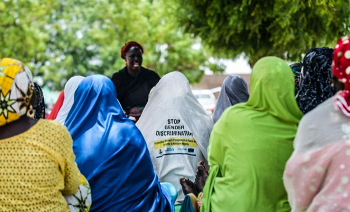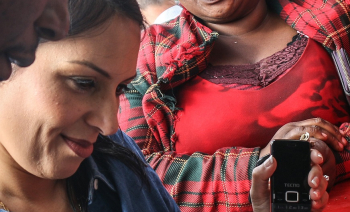Successful women entrepreneurs are fighting to create economic opportunities for those looking to follow their example and close the gap on gender inequality. Economic experts believe that an increase in women participating in the economy could drastically improve economic growth in both developed economies and emerging markets. There is overwhelming evidence on this economic rationale in support of women’s economic empowerment.
Capacity4dev spoke to economic experts at the European Development Days (EDDs) 2019 to discuss the obstacles blocking women from accessing the economy in an equal footing, the impact of increasing women’s participation in economy could have on gross domestic product (GDP) and the actions they are taking to empower women, such as by improving access to financial services.
President and CEO of Women’s World Banking (WWB), Mary Ellen Iskenderian, spent many years providing financial solutions to women across the globe. She believes that the involvement of women and women-owned businesses in the economy could have a significant impact on GDP.
‘If women had the same access as men to finance, technology, and all other economic inputs, we would have 28 trillion USD (25.3 trillion EUR) additional GDP growth annually, more than the GDP of the USA and China combined,’
she told Capacity4dev. Iskenderian continued to say that as women become more vocal participants in the economy, they can push for faster change. ‘In the next 20 years, women will control more than half of the wealth that is created in the world.’
According to Iskenderian, as a technical assistance provider, financial institution, and investor, the WWB has been able to reach out to women clients. While women-owned businesses are among the least well served by financial service providers, ‘It’s the area with the most potential,’ she said. The European Union together with KFW partners and the WWB help to improve women’s financial inclusion.
Spanish economist and Executive Director of the International Trade Centre (ITC), Arancha González Laya, explained the ITC’s goal to eliminate obstacles preventing women from participating in the economy. “[It’s not just that] they have a right to be there… economies need all the existing human resources, men and women, to grow in a more solid manner and therefore contribute to build stronger societies”.
‘Today … only one out of five exporters is a woman. This happens not because she does not want, but because she cannot be part of it. There is a considerable part of the economy that simply does not exist.’ ITC and the EU have a long-standing partnership to tackle issues, such as women’s economic empowerment.
Ex CEO of NMB bank Tanzania and Board member of Women’s World Banking, Ineke Bussemaker, is also working to eliminate gender inequality in the economy. ‘It is commonly known around the world that women have fewer opportunities and less access to formal financial systems than men do,’ she said. She aims to provide women with access to accounts, payments and loans to help grow their businesses.
Bussemaker worked with WWB to research women’s financial needs. This research revealed that in their financial behaviour, women prioritise their children and their children’s education. These results led the NMB and the WWB to develop a savings product aimed at helping women by providing the financial services they need.
Much like Iskenderian and González Laya, Bussemaker emphasises the absence of opportunities for women in business and stresses the importance of creating them: ‘Women are generally the ones who own small and micro businesses and… in emerging market economies, it’s the small and micro businesses that drive the economy,’ she told Capacity4dev.
Photo Credit: United Nations/UN Women/Rashid Probal (CC BY-NC-ND 2.0)






Log in with your EU Login account to post or comment on the platform.